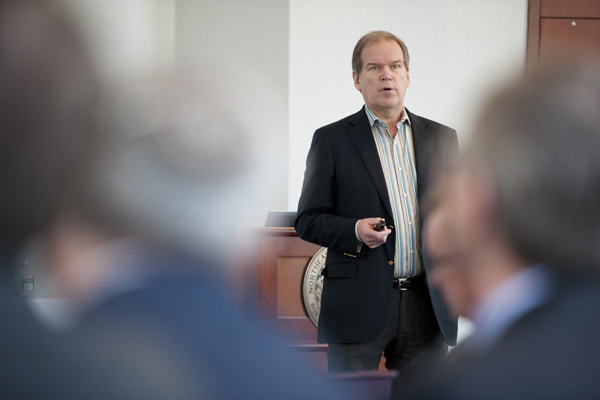Barnett Institute celebrates 40 years of scientific breakthroughs

This year marks the 40th anniversary of the founding of Northeastern’s Barnett Institute of Chemical and Biological Analysis, a milestone that was honored last week at a daylong conference on campus. During its 40-year history, the institute has pioneered breakthroughs in biotechnology, forensic science, and advanced materials study.
The conference welcomed industry and academic leaders from around the world; current and former students and faculty of the institute; and Laurie Werner and Eliott Barnett, children of Lou and Madlyn Barnett, who endowed the institute in 1983.
Through its four decades of research, the Barnett Institute has made several major scientific advancements in its field, including the development of new analytical techniques and instrumentation, a major analytical contribution to the Human Genome Project, and the discovery of novel biomarkers for cancer. Recently, Barnett researchers have been developing the next generation of pharmaceutical analysis to accommodate the increasingly complex biosimilar drugs now flooding the market.
Among the institute’s primary goals is a focus on industrial partnerships. “We’ve believed for a long time that industry and academia have to come closer together, and there’s a lot of commonality between them,” said Barry Karger, the institute’s founding director.

(Left to right:) Christoph Westphal, Barnett Institute director Barry Karger, Noubar Afeyan, Dieter Hoehn, Jonathan Fleming, Peter Barrett, and College of Science dean Murray Gibson. Photo by Brooks Canaday.
To honor that tradition, the institute established the Dieter and Inge Hoehn lecture series in 1999. Hoehn, a long time Barnett collaborator, was vice president and head of analytical products at Hewlett Packard for many years.
As part of the anniversary celebration, the annual Hoehn lecture welcomed four life science venture capitalists to discuss the role of academic-driven innovation in the success of biotechnology startups. The experts comprised Barnett alumnus and Celera co-founder Peter Barrett; Longwood Fund founder and partner Christoph Westphal; Oxford Biosciences managing partner Jonathan Fleming; and Noubar Afeyan, founder and CEO of Flagship Ventures.
“More and more, we’re working closely with universities to translate science,” said Barrett, a partner at Atlas Ventures, a Boston-based life sciences and tech venture capital firm. “If you look at the ecosystem we live in, the pharma and biotech companies need a pipeline; the academic institutions can only take things so far. We sit in the middle of that paradigm, being the translators of taking things out of academic institutions and building companies around them.”
Barrett, Westphal, and Afeyan discussed their support of startup companies, which take the “big idea,” as Westphal put it, out of the academic lab and turn it into a product or technology with societal impact. Fleming noted the critical triumvirate that makes that process possible in this country: academia, industry, and government.
“Almost everything that you’ve heard so far,” said Fleming, referring to the speeches given by his colleagues, “are ideas and techniques and methods and technologies that originated in a university and were paid for by federal funding.”
Going from a big idea to a commercial drug requires the expertise of more than six dozen people with different skill sets, according to Fleming. “A number of those key skill sets,” he said, “are ones that come out of the Barnett Institute.”
In closing, Fleming praised the institute. “Barnett has indeed become a leader in its field,” he said, noting Karger’s unparalleled contribution to its success.
After the symposium, the guests gathered in the Fenway Center for a gala celebration in honor of the institute’s anniversary and Karger’s 50 years of service to Northeastern. As part of the celebration, alumni and friends, including the Barnett Family, announced a new effort to establish the Karger Prize in Bioanalytical Chemistry.





